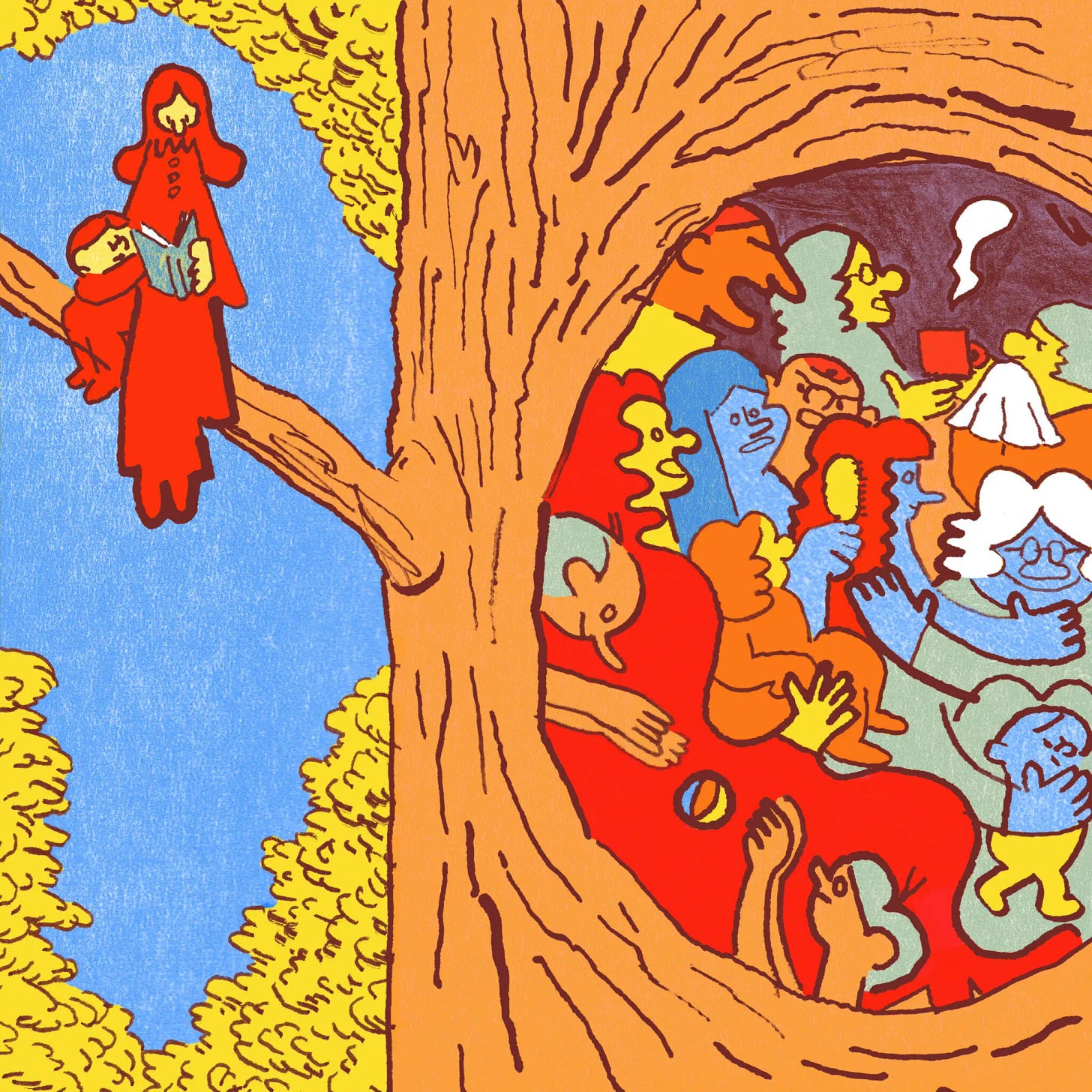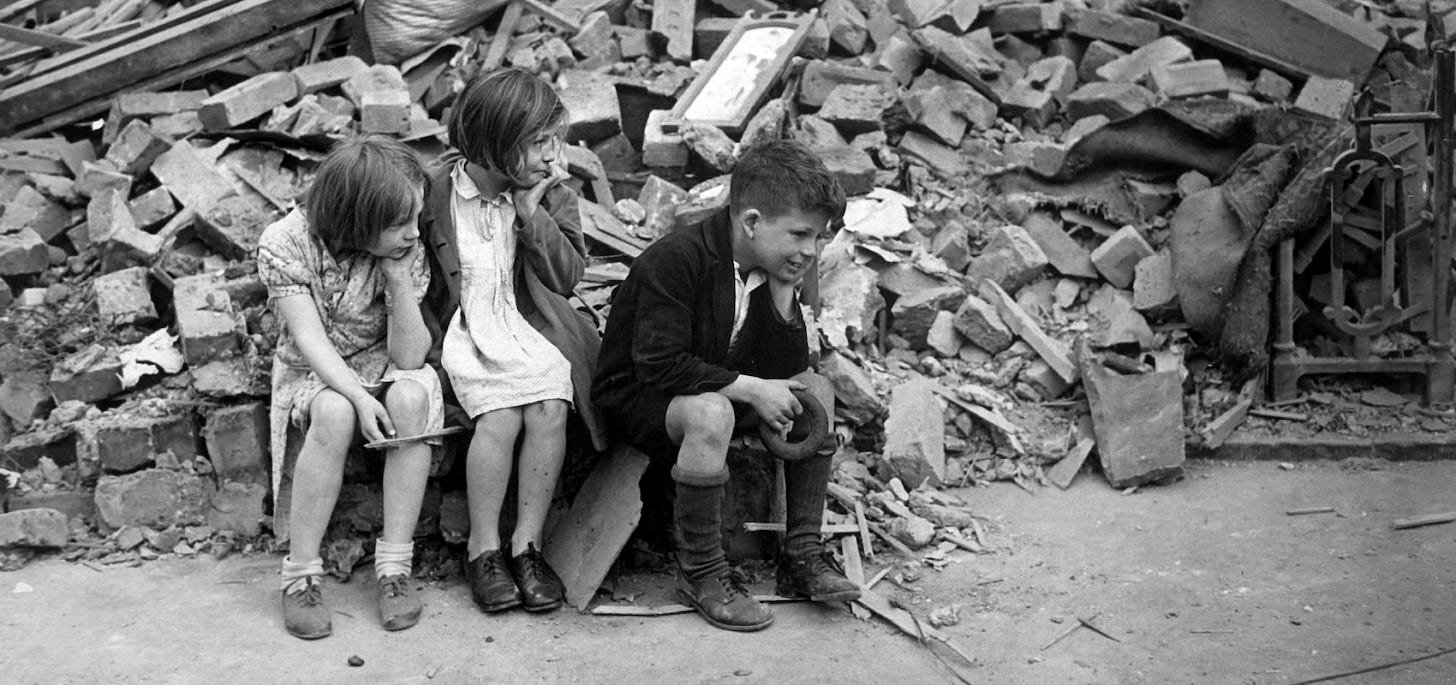Newsletter
Communal childrearing, cockney London, and gooning
Hi all,
This month I wrote for The New York Times on why most modern people don’t really want to return to ‘the village’:
To get a sense of how different the motherhood experience was even just a few centuries ago in the West, consider the experience of childbirth for a woman living in early modern England or the American colonies. It is from this setting that we get the word “gossip” — which was originally used to describe a godparent but came to be used for the women who attended a woman during labor.
Some accounts suggest that every female friend and relative was expected to attend, crowding into the birthing chamber to spectate and support, sometimes arguing with the midwife or with one another. The room was conventionally kept dark, with the doors and windows shut and any draft plugged, even the keyholes. In this gloomy, noisy, cramped, stifling space, the pregnant woman gave birth, and she remained in the birthing chamber for weeks afterward, tended to by her gossips.
It certainly wasn’t a lonely experience, but it can’t have been an easy one, either.
I also wrote an essay for First Things on the loss of indigenous London:
[C]ockney animosity is mostly not directed at immigrants. These newcomers are understood as instruments of a class warfare waged by the British elites, a view that was frequently voiced by the cockneys interviewed in The New East End. Those cockneys spoke bitterly of the “middle-class do-gooders” who had provoked communal tensions by favoring immigrants over natives and then labelling as racist anyone who resisted the new regime. The crowds in Epping, Canary Wharf, and Diss keep telling journalists much the same thing.
One could respond to this interpretation by pointing out that cockneys are materially better off now than they were in the past, which is surely true. One could also point out that modernity itself is at odds with any project of cultural preservation: People move, things change, “all that is solid melts into air.” Should we care if cockney culture melts away, too?
I say that we should.
And I appeared on Winston Marshall’s podcast:
Two recommendations for you all this month. The first is this gorgeous essay on the experience of going on a dark retreat, i.e. locking yourself away in a room for days on end with no light and waiting for the hallucinations to come:
I assured concerned loved ones that people used to do this stuff practically all the time. Taoist adepts once sealed themselves in dark chambers to refine mind and body. In Colombia, the Kogi raise spiritual leaders in caves, training them from birth in darkness to commune with a hidden dimension called Aluna. Ancient Greek rites unfolded underground, where sensory deprivation marked initiation.
Von Bujdoss has sought to recreate the Tibetan Buddhist version of this ritual. Practitioners would live alone in darkness for long stretches, in some cases years, in hopes of achieving nonduality — the recognition that the apparent separation between self and world is illusory. Our failure to appreciate this truth lies at the heart of the suffering we inflict on ourselves and others. Intense visions were common, way points on the path to dissolving the boundaries of perception.
In recent centuries, these retreats fell out of favor, partly because of the psychic distress they could set off. Von Bujdoss appreciated the stakes of such distress, but he also felt the stakes of not utilizing a powerful tool like this. Some disagreed; esoteric practices, perhaps, are meant to stay esoteric. For his part, von Bujdoss believed that the world no longer had the luxury of keeping ancient remedies in the dark.
At the other end of the sensory spectrum, this rightly celebrated essay on Gooners was the subject of a bonus episode I recorded with Meghan Murphy earlier this month:
Think about it for a second: What are these gooners actually doing? Wasting hours each day consuming short-form video content. Chasing intensities of sensation across platforms. Parasocially fixating on microcelebrities who want their money. Broadcasting their love for those microcelebrities in public forums. Conducting bizarre self-experiments because someone on the internet told them to. In general, abjuring connective, other-directed pleasures for the comfort of staring at screens alone. Does any of this sound familiar? Do you maybe know some folks who get up to stuff like this? It’s true that gooners are masturbating while they engage in these behaviors. You could say that only makes them more honest.
Granted, day-in-the-life TikToks or unboxing videos won’t poison your soul to precisely the same degree as gooner porn. But it’s hard not to see goonerism as just an intensification, almost a burlesque, of prevailing cultural trends. Pornosexuals are clearly not the only people out there in the process of retreating from life. It’s probably more useful to think of a company like Aylo—the owner of Pornhub and most of the other major tube sites, as well as most of the name-brand porn studios—as just another large tech-entertainment giant, like Meta, Netflix, or FanDuel. From these companies’ perspective, the ideal consumer would do literally nothing but goon, lose at gambling, and maybe watch other people play video games. You can try to fight this. You can read a book, pet a dog, buy a stupid box to lock away your phone. You can make a joke about the box, about the absurdity of your need for it. What do these companies care? They’ve won. If they have their way—and they usually do—in time we will all be gooners, of a kind.
Until next month —



The comments on your NYT piece are so frustrating! Did they even read the article? I can't understand the comments acting as if you're just lamenting some idyllic past, when... the whole point... is that we think we want a village, but we only sort of do (or only sometimes). Right?? This must be so annoying as an author!
“One could respond to this interpretation by pointing out that cockneys are materially better off now than they were in the past”
The same could be said of many indigenous peoples around the world, yet pointing this out will immediately invite charges of racism/white supremacy/colonisation etc, yet this argument doesn’t seem to apply to cockneys…